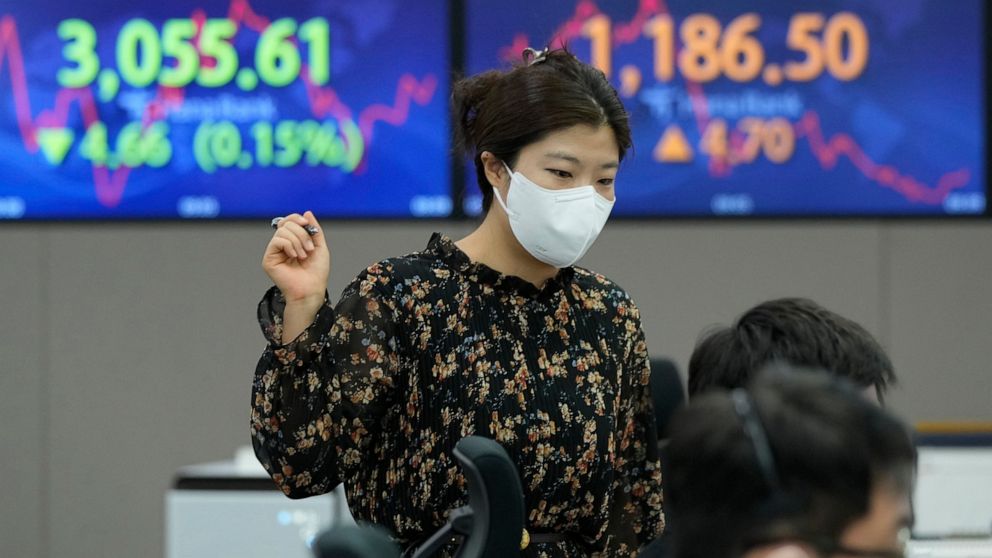Stocks rise in morning trading after US averts shutdown
Stocks are rising in early trading on Wall Street Thursday after U.S. lawmakers moved to avert a government shutdown. European and Asian markets are also rising. The S&P 500 is up 0.5% as of 9:33 a.m. ET, and the technology-heavy Nasdaq Composite is up 0.7%. Despite the gains Wall Street is on track to end September with its worst monthly performance in a year. The healthcare and materials sectors are leading the S&P 500 gainers early Thursday: Albemarle is up 2.9% and Edwards Lifesciences is up 1.5%. CarMax shares are plunging after the used car dealership reported disappointing second-quarter results.
THIS IS A BREAKING NEWS UPDATE. AP’s earlier story follows below.
European shares and U.S. futures climbed Thursday after U.S. lawmakers moved to avert a government shutdown.
Germany’s DAX edged 0.1% higher to 15,378.85 while the CAC 40 in Paris added 0.5% to 6,593.48. In London, the FTSE 100 also gained 0.5%, to 7,146.51.
The future for the Dow industrials was 0.7% higher while that for the S&P 500 also rose 0.7%.
Investors have had their eyes on Washington, where Democrats and Republicans in Congress have been wrestling over extending the nation’s debt limit.
Congress has moved to avert that crisis, with the Senate poised to approve legislation to fund the federal government into early December.
The House was expected to approve the measure following a Senate vote Thursday, preventing a partial government shutdown when the new fiscal year begins Friday.
If the limit, which caps the amount of money the federal government can borrow, wasn’t raised by Oct. 18, the country “would likely face a financial crisis and economic recession,” Treasury Secretary Janet Yellen told Congress on Wednesday.
Yellen’s remarks came a day after Senate Republicans blocked consideration of a bill that would have raised the debt limit.
Asian shares were mostly higher, though Tokyo’s Nikkei 225 index lost 0.3% to 29,452.66 after the release of disappointing factory and retail sales data.
Japanese investors appeared to take in stride the choice of former Foreign Minister Fumio Kishida to head the ruling Liberal Democrats and thus become the next prime minister.
Kishida is expected to boost government spending but keep in place most current policies aimed at supporting the world’s third-largest economy.
China Evergrande Group’s shares fell 3.9% as reports said the company, which is struggling to whittle down its debt, was likely to miss another payment on a bond.
Evergrande’s shares surged Wednesday after it announced it was selling a stake in Shengjing Bank to help repay a 10 billion yuan ($1.6 billion) its debt to the state-owned lender based in northeastern China.
Hong Kong’s Hang Seng index lost 0.4% to 24,575.64.
The Shanghai Composite index gained 0.9% to 3,568.17 and Australia’s S&P/ASX 200 jumped 1.9% to 7,332.20. In Seoul, the Kospi climbed 0.3% to 3,068.82.
The yield on the 10-year Treasury, which is used to set interest rates on many kinds of loans, slipped to 1.52% from 1.53%.
On Wednesday, the S&P 500 rose 0.2% to 4,359.46 after shedding most of a 0.8% gain. The S&P 500 was down 3.6% for the month with one day left to go.
The Dow Jones Industrial Average also lost momentum, but managed a 0.3% gain to 34,390.72, while the tech-heavy Nasdaq composite gave back 0.2% to 14,512.44.
The Russell 2000 index of small companies also fell, shedding 0.2% to 2,225.31.
Bond yields have stabilized after surging over the past week and weighing on the market, especially technology stocks. The higher yields have forced investors to reassess whether prices have run too high for stocks, because it makes them look expensive by comparison.
The next few weeks will bring a fresh round of corporate earnings that will give investors insights into how supply chain problems and higher costs are impacting corporate finances.
———
In other trading Thursday, U.S. benchmark crude oil rose 38 cents to $75.21 per barrel in electronic trading on the New York Mercantile Exchange. It gave up 46 cents to $74.89 per barrel on Wednesday.
Brent crude oil picked up 38 cents to $78.35 per barrel.
The U.S. dollar slipped to 111.90 Japanese yen from 111.96 yen. The euro rose to $1.1602 from $1.1599.
![]()


